Witness Community Highlights

The September 2018 issue of Witness Community Highlights is now available online. This issue includes two articles: Highlights of the Arctic Data Center’s recently established Data Highlights page, which provides insights directly from the researchers, including how their data might be applied to other questions in support of Arctic research; and NSF announcements of new Program Directors in the Arctic Sciences Section and new measures to protect the research community from harassment.
Call for Researcher Applications to Host a PolarTREC Teacher
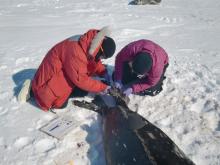
PolarTREC (Teachers and Researchers Exploring and Collaborating) is currently accepting applications from researchers for teacher research experiences. Researchers are invited to submit an application to host a PolarTREC teacher in the 2019 Arctic and/or the 2019-2020 Antarctic field seasons. Funding is pending for PolarTREC during the 2019-20 field seasons. ARCUS will keep researcher applicants informed of our funding status. If funding is secured, final matches should be made by January 2019. PolarTREC researchers must be at U.S. institutions. Applications from researchers on National Science Foundation (NSF) funded projects will receive priority in the selection process. Researchers should have secured funding for their research project prior to applying.
The increasing second derivative of Arctic change: how should the research community keep up?
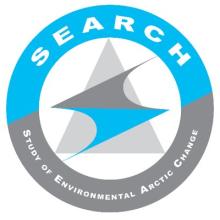
The Study of Environmental Arctic Change (SEARCH) seeks a broad conversation with past, present, and future members of its community on how SEARCH might serve to advance synthesis and engagement in the coming decades? What coordination of research and communication is needed?
Date: 5 October 2018
Time: 9:30 am (AK) / 10:30 am (Pac) / 11:30 am (Mntn) / 12:30 pm (Cntrl) / 1:30 pm (Eastern)
Format: video conference (Zoom)
Interested in participating? Register at: https://bit.ly/2NtXiEL
SEARCH Background:
Vision and Mission
Organization
Products:
Arctic Answers - science for policy briefs
Arctic Futures 2050 conference
Other products
For more information: Brendan Kelly, SEARCH Executive Director (bpkelly [at] alaska.edu)
Arctic Research Seminar Series with Jacqueline M. Grebmeier
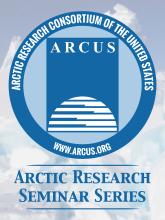
ARCUS invites registration for our next Arctic Research Seminar featuring Jacqueline M. Grebmeier (Chesapeake Biological Laboratory, University of Maryland Center for Environmental Science). This seminar, titled “The Pacific Arctic: An Ecosystem in Transition,” will be held Friday, 21 September 2018 from 12:00-1:00 p.m. ET in the ARCUS D.C. office at 1201 New York Avenue, NW Washington D.C. A live webinar is also available to those unable to attend in person.
Help Build a Database of Carbon Flux Measurements
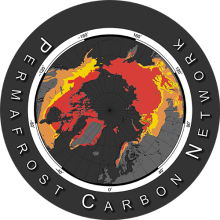
As part of the Permafrost Carbon Network's larger effort on 'Reconciling historical and contemporary trends in terrestrial carbon exchange of the northern permafrost-zone', we are initiating a community-effort to develop a comprehensive and annually updated database of high-latitude permafrost zone carbon flux measurements. This database, which builds on a breakout activity from the annual Permafrost Carbon Network meeting in 2017 and previous flux syntheses, could help to track temporal trends in Net Ecosystem Exchange (NEE) and benchmark ecosystem models. We invite you to be a part of this activity.
We seek initial data contributions by September 30th. If you are interested in contributing or have additional questions, please contact marguerite.mauritz [at] nau.edu (Marguerite Mauritz) or ted.schuur [at] nau.edu (Ted Schuur).
Arctic Answers Briefs

Browse SEARCH's Arctic Answers resources, where policy-relevant questions are answered in 1-2 page briefs written by experts, peer-reviewed, and posted in Arctic Answers. Each brief is the top of a "knowledge pyramid" supported by scientific literature organized in underlying tiers of increasing detail. Questions that are addressed include "Can extreme Arctic climate change be avoided with cost effective mitigation?", "How fast is sea level rising?", "How is climate change affecting subsistence (or traditional) fisheries in the high Arctic?" and many more.
Sea Ice Prediction Network
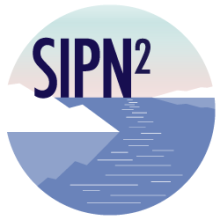
Phase 2 (SIPN2) announces registration for an open webinar on Tuesday, 11 September 9:00 am AK for “An Overview of MOSAiC - The Multidisciplinary Drifting Observatory for the Study of Arctic Climate” with presenter Don Perovich, Dartmouth College. The presentation will provide an overview of MOSAiC, with special attention on the sea ice program.
2019-2020 PolarTREC Application Period Open!
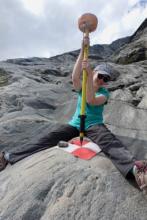
We are happy to announce that the 2019-2020 PolarTREC applications for teachers, informal educators, and researchers to apply to the program is open! Applications are due Monday, 24 September 2018 by 5PM ADT. An informational webinar will be hosted on Wednesday, 29 August 2018. More information about the program and how to apply can be found here.
Witness the Arctic
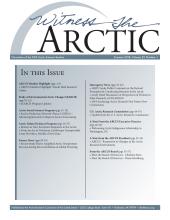
The Summer 2018 issue of Witness the Arctic is now published online. This issue includes a call for public comment on the Revised Principles for Conducting Research in the Arctic; news from a recent study indicating an increase in amplified Arctic temperatures; news of the recently developed use of remote sensing to study beaver encroachment in Arctic tundra; news about the EarthScope Transportable Array; updates from the SEARCH program, USARC, the Sea Ice Prediction Network–Phase 2, the women in polar research panel discussion during POLAR2018, and the 2018 Anchorage Arctic Research Day; comments from ARCUS board members, Board President Audrey Taylor, and Executive Director Bob Rich; and a highlight of ARCUS member institution, the Woods Hole Research Center.
2018 August Sea Ice Outlook Report Available

The August report for the 2018 Sea Ice Outlook (SIO) is now available online. The goal of the SIO is to improve sea ice prediction on seasonal time-scales. For the August report, 39 contributions were received that include pan-Arctic predictions. Of those contributions, 10 also included pan-Antarctic predictions and 11 included predictions for Alaskan waters. For the Arctic, the median August Outlook value for a September 2018 sea ice extent projection is 4.6 million square kilometers.
The August report includes an overview of projections of total September Arctic ice extent; a section about predicted spatial fields with discussion on sea ice probability (SIP) and the first ice-free day (IFD) from a number of dynamical models; a section on current conditions and atmospheric conditions; a section discussing regional sea ice conditions; and a section discussing Antarctic sea ice extent forecasts.
This report is the product of the Sea Ice Prediction Network–Phase 2 (SIPN2) effort.
Upcoming PolarConnect Live Events
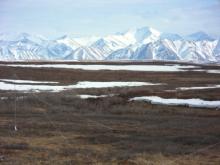
Please join us for two live events in August about research in the Arctic and in the mountains of Switzerland!
Monday, 13 August 2018 at 9:30am AKDT – PolarTREC teacher Svea Anderson and University of Alaska researcher Donie Bret-Harte will discuss their research live from Toolik Field Station in Alaska looking at Shrubs, Snow and Nitrogen in the Arctic.
Thursday, 23 August 2018 at 7:00am AKDT – PolarTREC teacher Lauren Neitzke Adamo along with researchers Dr. Neal Iverson and Dr. Luke Zoet will be live from the mountains of Switzerland discussing their work on Sliding Glaciers.
Review the Draft "Principals for Conducting Research in the Arctic"
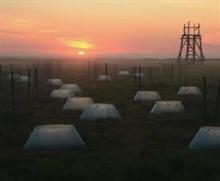
The Interagency Arctic Research Policy Committee (IARPC) is seeking comment from the public on newly revised Principles for Conducting Research in the Arctic by September 4, 2018. IARPC is interested in all comments on the Principles document, including the core principles and sub-bullets describing the approaches that researchers are encouraged to adopt across all stages of research.
Call for Sea Ice Outlook Contributions
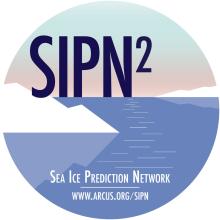
The Sea Ice Prediction Network–Phase 2 (SIPN2) announces the call for contributions for the 2018 Sea Ice Outlook August report. The Sea Ice Outlook provides an open process for those interested in Arctic sea ice to share ideas. The monthly reports contain a variety of perspectives—from advanced numerical models to qualitative perspectives from citizen scientists. Submissions are due Monday, 13 August 2018.
Understanding High Latitude Methane In a Warming Climate
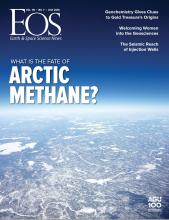
SEARCH brought together international experts to estimate how much methane might be released from thawing permafrost in the Arctic. The current state of knowledge and on-going efforts to improve our knowledge are detailed in a project update from EOS magazine. The SEARCH workshop was funded by the National Science Foundation, the National Aeronautics and Space Administration, the U.S. Geological Survey, and the U.S. Arctic Research Commission.
2018 July Sea Ice Outlook Report Available

The July report for the 2018 Sea Ice Outlook (SIO) is now available online. The goal of the SIO is to improve sea ice prediction on seasonal time-scales. For the July report, 39 contributions were received that include pan-Arctic predictions. Of those contributions, 9 also included pan-Antarctic predictions and 11 included predictions for Alaskan waters. For the Arctic, the median July Outlook value for a September 2018 sea ice extent projection is 4.7 million square kilometers.
The July report includes an overview of projections of total September Arctic ice extent; a section about predicted spatial fields with discussion on sea ice probability (SIP) and the first ice-free day (IFD) from a number of dynamical models; a section on current conditions and atmospheric conditions; a section discussing regional sea ice conditions; and a section discussing Antarctic sea ice extent forecasts.
The July report is the product of the Sea Ice Prediction Network–Phase 2 (SIPN2) effort. The goal of the previous SIPN1 was to enhance scientific discussion on the physics that control summer sea ice extents. In SIPN2 there is a further analysis of quantitatively comparing model forecast output.
PolarTREC Expeditions in the Arctic!
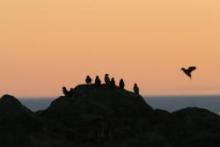
PolarTREC has five teachers in the field in July and August. Please join us in following their expeditions. Teachers will be working on Migration and Carry-Over Effects in Arctic Seabirds, Shrubs, Snow and Nitrogen in the Arctic, Permafrost and Community, Sliding Glaciers and Winter Respiration in the Arctic. Also, please join us for upcoming PolarConnect Events with each of these teachers.
Rising Oceans Guaranteed: Arctic Land Ice Loss and Sea Level Rise
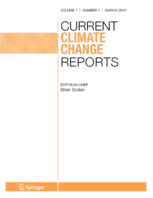
A new journal article authored by members of SEARCH's Land Ice Action Team reviews sea level contributions from land ice across the Arctic.
Advancing Predictability of Sea Ice – SIPN2 Webinar Registration
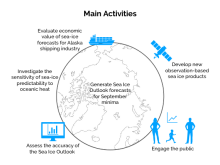
Registration is now available for the SIPN2 webinar, Advancing Predictability of Sea Ice. This webinar will provide an overview of the SIPN2 main activities and an overview of the SIPN Data Portal for sea ice prediction. The event will held at 9:00am to 10:00am (AKDT) on Tuesday, 10 July 2018.
Witness Community Highlights

The June 2018 issue of Witness Community Highlights is now available online. This issue highlights results from a recent program that focused on the sea state and boundary layer physics of the emerging Arctic, defined by less sea ice and larger expanses of open water in summer. The program was motivated by the observed increase in surface wave activity that has been coincident with the seasonal reduction in sea ice.
2018 June Sea Ice Outlook Report Available

The June report for the 2018 Sea Ice Outlook (SIO) is now available online. The goal of the SIO is to improve Arctic sea ice prediction on seasonal time-scales. For June, we received 34 contributions that include pan-Arctic predictions, of those contributions 10 also included pan-Antarctic predictions and 11 included predictions for Alaskan waters. We received one additional contribution with a regional focus on the Nares Strait. For the Arctic, the median June Outlook value for a September 2018 sea ice extent projection is 4.6 million square kilometers. The June report includes analysis of the contributions, predicted spatial fields with discussion on sea ice probability (SIP) and the first ice-free day (IFD) from a number of dynamical models; a section on current conditions with discussion on this winter's record low sea ice conditions and atmospheric conditions; a section discussion regional ice conditions; and a section discussing Antarctic sea ice extent forecasts.
ARCUS on Emerald Planet
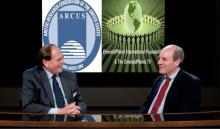
Dr. Robert Rich, Executive Director of ARCUS, ARCUS Board Member Kaare Erickson from Utqiaġvik, Alaska and PolarTREC teacher Deanna Wheeler from JC Parks Elementary School are guests on the weekly program Emerald Planet. Dr. Rich (0:01-0:13), Deanna (0:30-0:43) and Kaare (0:46-0:58) are interviewed as leaders who work with researchers, indigenous communities, and stakeholders in the Arctic, as well as educating today’s youth and future leaders about the Arctic, and how what we do on a daily basis can make a difference.
ARCTIC FUTURES 2050: A CONFERENCE
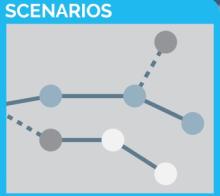
In 2019, SEARCH and partners will convene Arctic scientists from all disciplines, indigenous knowledge holders, and decision makers to share current understanding and identify future directions for research needed to inform Arctic policy. The conference also is intended to foster more effective and iterative collaborations among Arctic scientists and decision makers.
DATES: 4-6 September 2019
VENUE: National Academy of Sciences,
2101 Constitution Avenue, NW
Washington, DC
Watch for updates at https://www.searcharcticscience.org/arctic-2050
For more information, contact:
Brendan P. Kelly
Executive Director
Study of Environmental Arctic Change
bpkelly [at] alaska.edu
ARCUS at POLAR2018
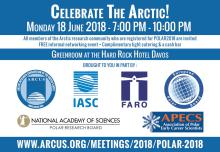
Staff and Board members from the Arctic Research Consortium of the United States (ARCUS) look forward to meeting with members of the Arctic research community at POLAR2018, a joint event hosted by the Scientific Committee on Antarctic Research (SCAR) and International Arctic Science Committee (IASC) at the Congress Centre in Davos, Switzerland. Our representatives plan to attend IASC/ASSW Business & Satellite Meetings as well as the SCAR/IASC Open Science Conference (OSC) between 15—23 June 2018. We invite you to seek us out during proceedings or at the following scheduled events.
PolarTREC Live Event from Toolik Field Station, Alaska
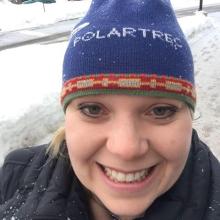
Join us for a LIVE event from Toolik Field Station, Alaska where we'll be learning all about the Arctic! The event will be held on June 20, 2018 starting at 9:00 AM Alaska Daylight Time. This event will feature PolarTREC teacher Melissa Lau and researchers, Dr. Steve Oberbauer and Dr. Jeremy May. The team will be sharing what it's like to be working in the Arctic as well their research as part of the Arctic Observing Network (AON). They are researching the relationships between vegetation change, plant phenology, and ecosystem function in a warming Arctic. More information about their research as well as journals and photos can be found on their expedition page.
Witness Community Highlights

The May 2018 issue of Witness Community Highlights is now available online. This issue highlights the efforts of the CICE Consortium. The consortium aims to incorporate and maintain scientific sea ice model development in CICE, also known as the Community Ice CodE, and accelerate its transfer into operational applications.
